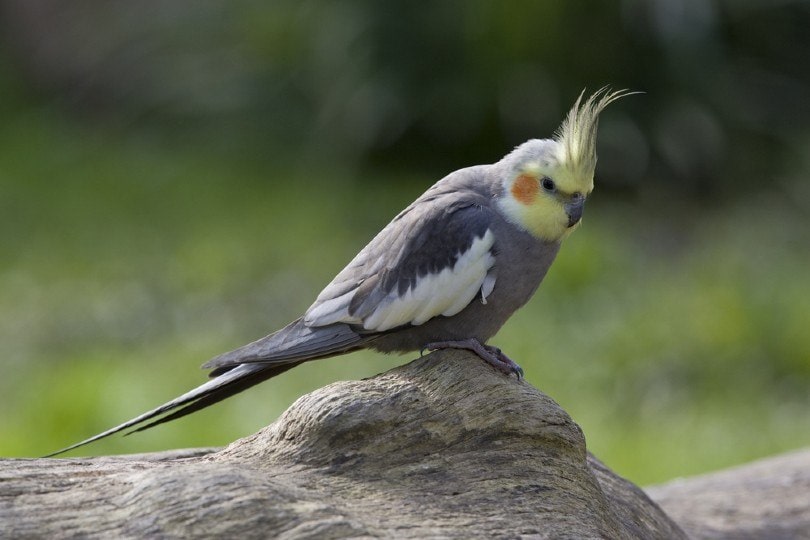

Cockatiel harnesses are devices that allow your cockatiel to fly outdoors without the fear of losing the bird. Although these devices may seem very advantageous, there is a lot of debate surrounding their ethicality and safety.
Unfortunately, it’s impossible to give a simple answer to whether or not cockatiel harnesses are ethical. When used correctly, they can be a great way to provide your bird natural flying experience. However, it is very difficult to acclimate cockatiels to harnesses, and a lot can go wrong.
If you are considering using a cockatiel harness, there are a lot of factors you need to consider first. Knowing the purpose of a cockatiel harness, how to train your cockatiel, and the risks associated with these harnesses are a great place to start.

Purpose and Use of a Cockatiel Harness
The purpose of a cockatiel harness is very simple. Whenever the cockatiel wears the harness, it allows you to take your feathery companion outdoors without worrying about the bird flying away. In many ways, a cockatiel harness is comparable to a dog harness or leash.
Cockatiel owners often use harnesses because cockatiels are birds that like to fly quite a bit. The harness allows the bird to fly outside and stretch its wings more. At the same time, the harness prevents the bird from completely flying away.
Do Cockatiels Like Harnesses?
If introduced to and trained with the harness from an early age, cockatiels will likely not be afraid of the harness. That is not to say that they will like the harness, but it will not stress them out or cause them any fear. However, birds that are not introduced to their harnesses properly will likely be frightened and stressed from the harness.
The only way to get your bird accustomed to its harness is through training. This works best for young birds that will be in your care for their entire life. Introducing older cockatiels to a harness may be more difficult, but it is possible that the training will go smoothly.
If you force the harness on the cockatiel, the bird will likely associate the harness with pain, fear, and discomfort.

What Are the Risks Associated with Cockatiel Harnesses?
In theory, cockatiel harnesses provide a safe and pain free flying experience for both you and your bird. However, a lot can go wrong whenever you put a cockatiel in a harness.
Injuries and Tangles
The most obvious risk associated with cockatiel harnesses are injuries and tangles. Whenever your bird takes off, it may try to fly into bushes or trees. The branches from these plants can cause the harness to get wrapped and tangled up. As a result, the bird may get injured, or you may have difficulty retrieving the bird.
Additionally, injuries can happen if you are not gentle when putting the harness on the bird. Injuries are most likely to happen if the bird is scared of the harness and you force it on them. It is much less likely that the bird will be injured in the case that it is calm around the harness.
Accidentally Letting Go of the Harness
One thing that happens more often than you would think is accidentally letting go of the harness whenever the bird is flying. This is incredibly dangerous because the pet cockatiel is domesticated and does not know how to survive in the wild.
If you are unable to retrieve the cockatiel, it will likely die. Unfortunately, trying to get a cockatiel to come back to you is much more difficult than trying to get your dog to come back.
Even if you think that you would not be stupid enough to let go of your cockatiel harness, this is a really big risk you have to keep in mind. People accidentally let go of their harness all the time without thinking about it. You cannot assume that you would be any different.
Fear of the Outdoors
Another risk that you might not think of is that the outdoors may actually scare your cockatiel. If your cockatiel is domesticated, it has likely never experienced outdoors. The sights and sounds can easily stress or scare the bird.
If your bird gets too scared or stressed, it can become sickly later on, or your bird may try to fly away quickly, jerking the harness out of your hand. You have to train your cockatiel to the outdoors as a result.

Are Cockatiel Harnesses Ethical?
Now that we have discussed the purposes and risks associated with cockatiel harnesses, we can better tackle answering whether or not the harnesses are ethical. When used correctly and safely, cockatiel harnesses can be ethical. However, these devices can quickly turn unethical if they are forced on the cockatiel or not used safely.
Ethical Uses of a Cockatiel Harness
Cockatiel harnesses are ethical whenever the bird is not scared of the harness and the owner uses the harness safely. In most cases, ethical cockatiel harnesses are used on birds that have been trained on the harnesses from an early age. Additionally, the harnesses are ethical whenever the owner is careful to prevent any of the risks mentioned from happening.
Unethical Uses of a Cockatiel Harness
Unfortunately, cockatiel harnesses can become unethical very quickly. Owners that force the harness on the cockatiel, even when the bird is scared of it, are demonstrating unethical use of the harness. More so, the harness is unethical if the owner is nonchalant or careless when using it outside.

How to Use a Cockatiel Harness
At the end of the day, the ethicality of a cockatiel harness comes down to how you, the owner, use the harness. If you train your cockatiel from an early age to use the harness and are diligent in being as safe as possible with the harness, it is an ethical and fun device.
Training Your Cockatiel
One of the most important steps when using a harness is to train your cockatiel with it. Begin by introducing your cockatiel to the harness by simply letting the bird observe it. We don’t recommend leaving the harness in the cage because the bird may try to pick at it.
As the cockatiel gets accustomed to the harness, you can touch the harness to the bird. If the bird does not show any signs of fear, you can try to place it on the cockatiel. Do not try to put the harness on the cockatiel unless the bird completely trusts you and lets you touch it everywhere.
You want to put the harness on small amounts of time at first. As the bird gets more accustomed to the harness, you can increase the time, eventually bringing the bird outside while it is wearing the harness.
During this process, you have to train your bird to leave the harness alone. Cockatiels are smart enough to figure out how to get out of their harness if given the opportunity. The last thing you want is to bring your bird outside only for it to escape the harness.
As you are training your cockatiel with the harness, we also recommend training your cockatiel to the outside. Put your cockatiel in an easily transportable cage and bring the entire cage outside. Obviously, make sure that the cage is completely shut before doing this.
Tips for Safety
Whenever you first bring your cockatiel outside, we recommend keeping a very short leash. This will allow you more control over the bird, leading to less risks. More so, don’t let the bird fly around trees. Trees are a disaster waiting to happen.
Be on your utmost behavior when bringing your cockatiel outside on a harness too. Do not text, be on your phone, or do anything else that can be a distraction. Distractions can cause you to accidentally let go of the harness.
For best results, you might want to consider attaching the harness to your body. For example, you can use some sort of a connector so that the harness is attached to a belt loop or your wrist. This will ensure that the bird can’t get away, even if you do get distracted for a moment.

Final Thoughts
Cockatiel harnesses can be a great way to bring your cockatiel outside in a safer way. However, there are a lot of risks involved with cockatiel harnesses. Because these harnesses can be so risky, they are a bit questionable ethically speaking.
At the end of the day, it is up to you to decide if these devices are ethical. If you train your bird around the harness and are very safe when using it, they are ethical. If your bird shows any signs of stress, we recommend not using the harness at all.
Featured Image Credit: Bildagentur Zoonar GmbH, Shutterstock
Nicole is the proud mom of Baby, a Burmese cat and Rosa, a New Zealand Huntaway. A Canadian expat, Nicole now lives on a lush forest property with her Kiwi husband in New Zealand. She has a strong love for all animals of all shapes and sizes (and particularly loves a good interspecies friendship) and wants to share her animal knowledge and other experts’ knowledge with pet lovers across the globe.






